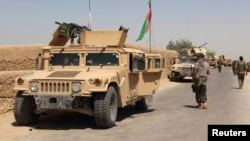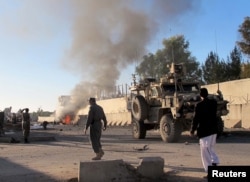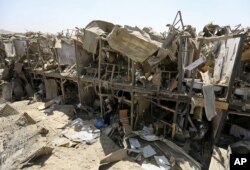Taliban militants fighting Afghan security forces in southern Helmand province are being strengthened by an elite new commando force called 'Sara Khitta' - the Red Brigade in the Pashto language.
Afghan officials say Taliban advances have been boosted by the several hundred fighters of the unit, including a large number of foreign nationals fighting with them.
“Helmand has now become a target of international terrorists’ agenda,” Helmand governor Hayatullah Hayat told VOA. “Foreigners who are fighting for the Taliban include Pakistanis, Chechens, Azerbaijanis, and Turkmens. We have strong evidence to prove our claim.”
The existence of the unit was first reported by VOA and wire agencies early last week.
Helmand, which borders Pakistan, has been one of the most restive provinces during the past few years.
The largest Afghan province has been the scene of fierce battles between the Taliban militants and Afghan troops in recent weeks.
Residents say the Taliban has made rapid advances and lately the fighting has been taking place in districts around the provincial capital of Lashkar Gah, effectively besieging the city.
The fight is increasingly drawing well-equipped and trained foreign mercenaries, Afghan officials say.
“Foreigners have been present in this strategic province for many years; they receive support from neighboring countries,” Mohammad Karim Atal, head of the Helmand provincial council, told VOA. “Pakistani Punjabi fighters, along with other foreigners, are fighting in the current battles in Helmand.”
The provincial council head added that some battles are led by the outside commanders. “In some places, foreigners lead the fight,” Atal said. “They have all the resources, they plan and lead the fight. They possess modern weapons and sophisticated maps. They use advanced technology and techniques.”
According to the provincial council head, foreign fighters cross into Helmand from neighboring Pakistan through remote districts controlled by the Taliban. “Most of the militants come through southern districts of Helmand…They transport their wounded fighters to Pakistan through the same route.”
Pakistan Foreign Ministry spokesperson Nafees Zakrya, who spoke to VOA’s Deewa service, accused the Afghan media of spreading baseless reports and being unreliable. He did not comment on the recent Afghan claims.
But experts in both Afghanistan and Pakistan say foreign fighters have participated in militant groups in various parts of Afghanistan.
“Foreign fighters are undoubtedly present in the Taliban ranks,” said Kabul-based Taliban analyst, Wahid Muzhda. “Militants from Pakistan, the Islamic Movement of Uzbekistan and some Tajik nationals have been with the Taliban in Afghanistan.”
According to Muzhda, Pakistan-based militants provide substantial manpower to their Afghan counterparts.
He said many militants from Central Asian nations pledged allegiance to and joined the Islamic State group’s Khorasan chapter after the Taliban announced that it did not have an “international agenda.” But, he added, that a significant number of foreign militants still fight alongside the Taliban.
Khadim Hussain is a Peshawar-based security analyst and author of the book "The Militant Discourse" — Religious Militancy in Pakistan. He told VOA that several militant groups previously affiliated with al-Qaida in Pakistan have joined forces to carry out militant activities inside Afghanistan.
He said the highly organized umbrella network was brought together last year after the death of Taliban leader Mullah Mohammad Omar was confirmed, and includes internationally designated terrorist organizations such as Lashkar-e-Taiba, Jaish-e-Mohammad and the Haqqani network.
In addition to the current battle in Helmand, Hussain said, the network reportedly played a major role in the fall of northeastern Kunduz province to the Taliban last year and participated in several attacks in eastern Nangarhar and in the capital, Kabul.
Hussain said a number of Pakistan-based militant groups have abandoned their activities in Pakistan to focus on Afghanistan. “The Moawia Taliban splinter group in Punjab publicly denounced fighting the Pakistani state but said it was legal to fight against Afghanistan,” said Hussain.
The presence of foreign fighters in Afghanistan reaches its peak during summer months, partly because of the “seasonal Taliban” — madrassa or religious seminary students from Pakistan who join Afghan militants during their summer vacations, according to Muzhda.
“That has been the trend for many years. The madrassas that support the Taliban ideology send their students to Afghanistan to participate in 'practical jihad' as an encouragement and incentive to the students,” said Hussain, adding that the students are sent to “put the theory into practice,” after being taught the importance of jihad.
He added that it is very likely that students from madrassas in Karachi, Punjab and Pakhtunkhwa province have participated in the Helmand battle.
Afghanistan’s northeastern province of Kunduz briefly fell to the Taliban last year. Afghanistan's Foreign Ministry said around 1,300 foreign militants, most of them members of the Pakistani Taliban, had participated in the assault on Kunduz.







